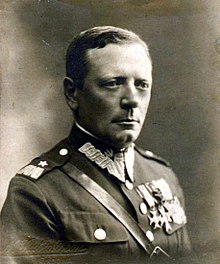Franciszek Kleeberg
Franciszek Kleeberg (born February 1, 1888 in Ternopil , Galicia , Austria-Hungary , † April 5, 1941 in Weißer Hirsch , Dresden ) was a Polish brigadier general in World War II . In 1939 he was Commander-in-Chief of the SGO Polesie .
Life
From 1908 he studied at the kuk Technical Military Academy in Mödling and left it in 1910 as captain of the artillery. During the First World War he served from May 1915 to July 1917 on the staff of the 2nd Polish Legion in Galicia. In 1917 he became chief of staff of the 2nd Brigade and in 1918 he was recalled from service as an active staff officer of the 3rd Brigade after the collapse of the Austro-Hungarian monarchy . On April 16, 1918, he married Wanda Paszkowska and on July 19, 1920 their son Zbigniew Tadeusz was born.
He joined the newly formed Polish Army in November 1918 and was assigned to the General Staff. Until March 1919 he acted as chief of staff of the "Eastern" Command under the direction of General Tadeusz Rozwadowski . In April 1919 he became head of the organization department and deputy head of the mobilization and organization department in the War Ministry for two months.
During the Polish-Soviet War he was appointed Chief of Staff of the 1st Army in July 1920 and on August 15 of that year as Chief of Staff of General Kazimierz Raszewski's Einsatzgruppe . After the end of the hostilities in October 1920, he assumed the position of Chief of Staff of the Poznan Military District (later VII Corps District), which he held until October 1922.
On October 6, 1922 he was elected Chairman of the Board of Directors of the Soldiers of the 8th Corps in Poznan. On November 7, 1922, he was appointed commander of the 14th Infantry Division in Poznan on behalf of the sick Colonel Aleksander Załęski. He was only supposed to take up his post on January 1, 1923 and commanded this division until May 1924. In the meantime, he completed an information course for commanders. From June 1924 to October 1925 he stayed in France, where he studied at the Paris École Supérieure de Guerre, the infantry training center in Versailles and the artillery training center in Metz. After completing his military studies at the War Academy in Paris (1924/5) he became head of the Higher War School in Warsaw. On March 17, 1927 he was appointed commander of the 29th Infantry Division in Grodno . On January 1, 1928, the President of the Republic of Poland, Ignacy Mościcki , promoted him to Brigadier General , from which time he was close friends with General Władysław Sikorski . In 1934 he became commander in the III. Corps district of Grodno and 1937 commander in IX. Corps district of Brest-Litovsk .
After the attack by the German armed forces on Poland, he was commissioned from September 9, 1939 to set up the independent SGO (Samodzilna Grupa Oberacyjna, independent operational group) Polesie, which should cover Brest and Kobryn and proceed to Kowel from September 17 . Via Kamien Koszyrski and from September 27th via Wlodowa he tried to bring help to the besieged capital Warsaw from the east. On September 30th, he united his units in the Lubin area with the cavalry brigade "Zaza" (General Podhorski ), not knowing that Warsaw had already surrendered. His units, reinforced by remnants of the 50th and 60th Infantry Divisions, suddenly found themselves attacked all around, from the east the Soviets and the German 13th division and from the west the German 29th division (motorized). At Jabłoniem and Milanów he fought back the advanced columns of the Red Army . On October 6, 1939, after four days of fighting with German troops in the Battle of Kock , he was the last Polish unit with 8,000 men to surrender due to a lack of ammunition and was captured. He was interned at the Königstein Fortress near Dresden. After a year and a half he became seriously ill with the heart and died on April 5, 1941 in a hospital in Weißer Hirsch. He was buried in the Neustädter Friedhof. On January 1, 1943, he was posthumously appointed major general by the Polish government in exile . In 1969 his ashes were collected and buried on October 6th in the war cemetery in Kocker among his fallen soldiers.
See also
Web links
- Franciszek Kleeberg in dzieje.pl (Polish)
Individual evidence
- ↑ Franciszek Kleeberg in www.1939.pl (Polish)
| personal data | |
|---|---|
| SURNAME | Kleeberg, Franciszek |
| BRIEF DESCRIPTION | Polish general |
| DATE OF BIRTH | February 1, 1888 |
| PLACE OF BIRTH | Ternopil , Galicia , Austria-Hungary |
| DATE OF DEATH | April 5, 1941 |
| Place of death | White deer , Dresden |
